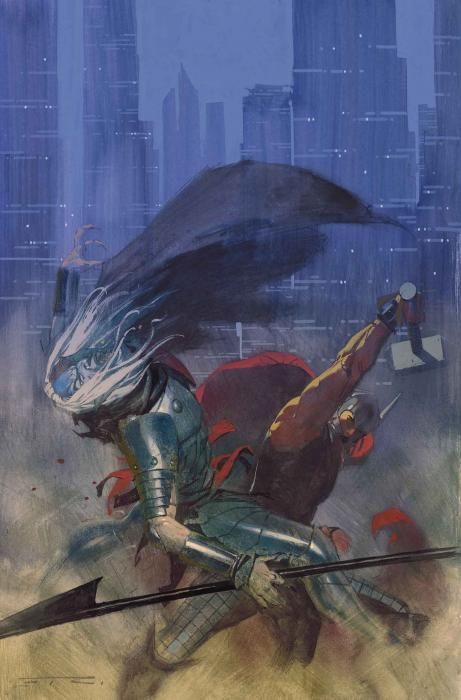The conclusion to "Accursed" in Jason Aaron, Emanuela Lupacchino and Ron Garney's "Thor: God of Thunder" #17 keeps up the tone from the previous installments, eschewing the epic feel of the "Godbomb" storyline for a somewhat lighter, more traditional fantasy story. That said, there are still surprises in store, as the ending really throws the League of Realms for a loop. This twist sets up for a nine-worlds-wide war; depending on where the creative team wants to take that idea, the tone could be headed back for brutal and serious soon enough.
Aaron's tone does admittedly veer throughout this issue, resulting in a strange mix of the humorous and the horrible. The climactic fight bears many hallmarks of Thor at his most amiably over-the-top, with loads of onomatopoeia, punning boasts, and even a few magic tricks. However, it's also pretty grotesque. Malekith's attacks on the other Dark Elves are inventively and invasively nasty, and if Aaron had wanted to go full-on fun, he might've toned those down. For me, this inconsistency wasn't a problem, but I can see how it might take some readers out of the story.
On art, Lupacchino and Garney provide all the appropriate swashbuckling and smashing. Their scenes are vibrant and full, with very little empty space in the panels, and it creates a satisfying sense of scale and energy. Svorcina and Louhridge bring in a fantastic color palette that's packed with contrasts, and it's altogether a lot to enjoy. If there's any corner of the MU where artists ought to enjoy stretching their imaginations, it's Asgard, and this artistic team is getting into the world building.
However, while the climax was suitably action-packed, it's the aftermath that steals the show. What most interests me about this installment is that it's the first Thor storyline to engage with the practical problems of Asgardia's new parliamentary monarchy (parliamentary matriarchal triumvirate?). With the new inter-realm legislature, Thor and the Asgardians can no longer Odin-Allfather their way through a conflict by crushing the opposition. Instead, they are forced to respect Svartalfheim's sovereignty - even when Svartalfheim makes a decision they do not like. Thor is surprised and offended that the Dark Elves don't want to have to rely on him. He can't understand why they would rather be precariously independent than safe and dependent on Asgard. Watching Thor grapple with that realization is an interesting use of the new rules in Asgardia; they've had a massive governmental overhaul, and until now no one has looked at what that might mean for how Thor problem-solves.
After the acclaim that "Godbomb" received, it wasn't surprising that a lot of people rejected the new tone of "Accursed." However, Thor doesn't just live in a world where there are wolves at the gate; he also lives in a world where Volstagg the Voluminous is at the dinner table. He's a space Viking, with all the absurdity and awesomeness that that implies. It's nice to see Aaron embracing both elements (though wisely not in the same arc).

